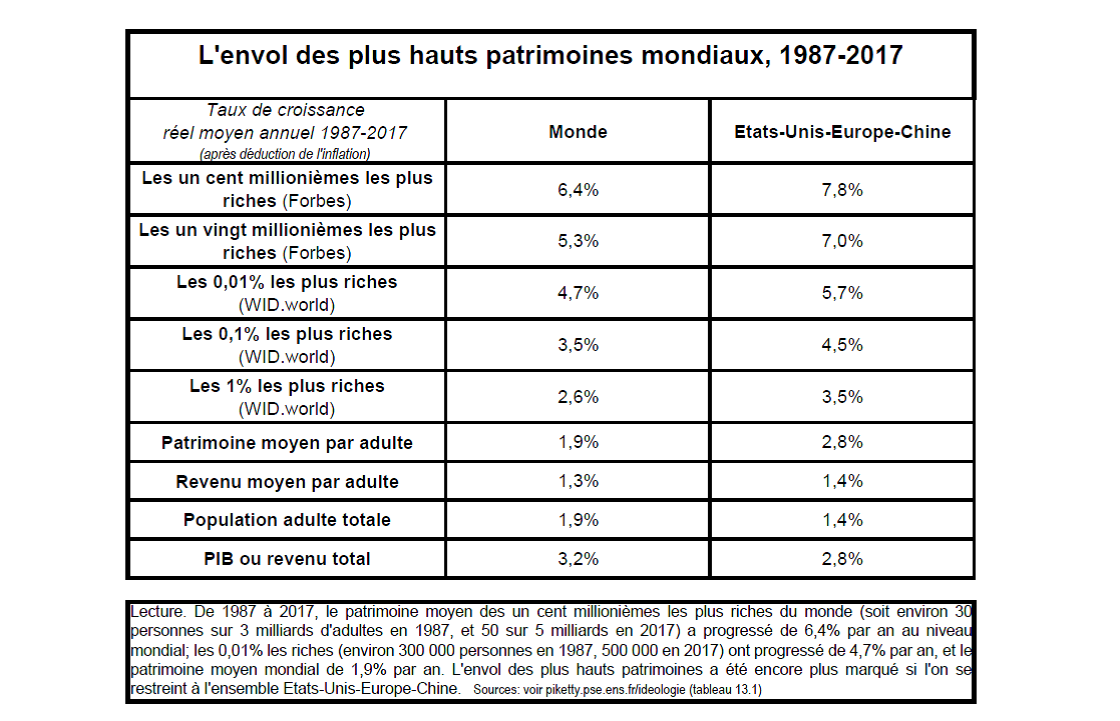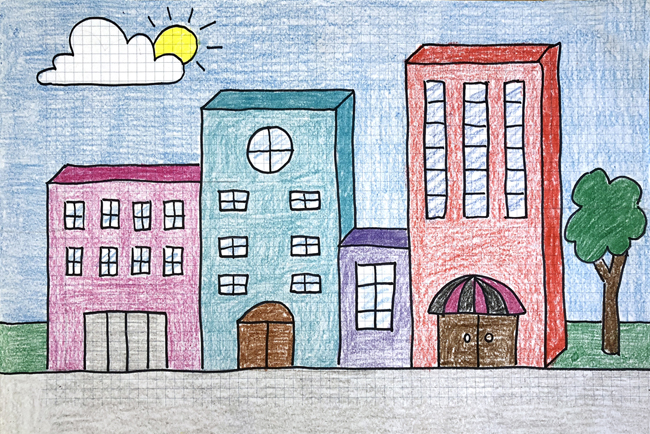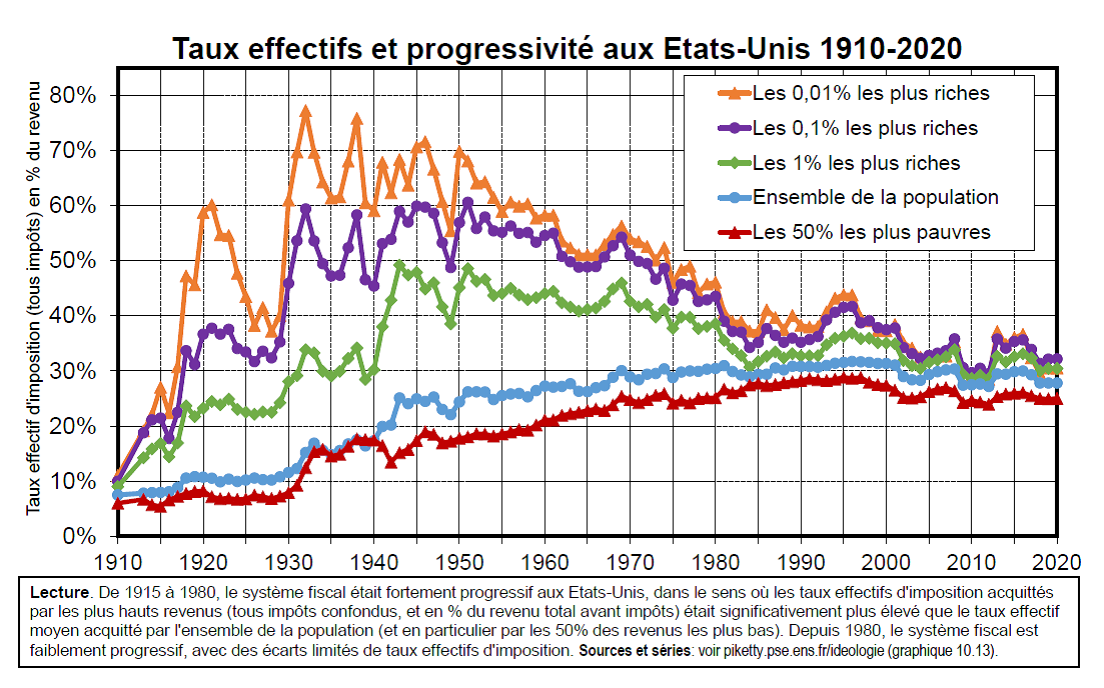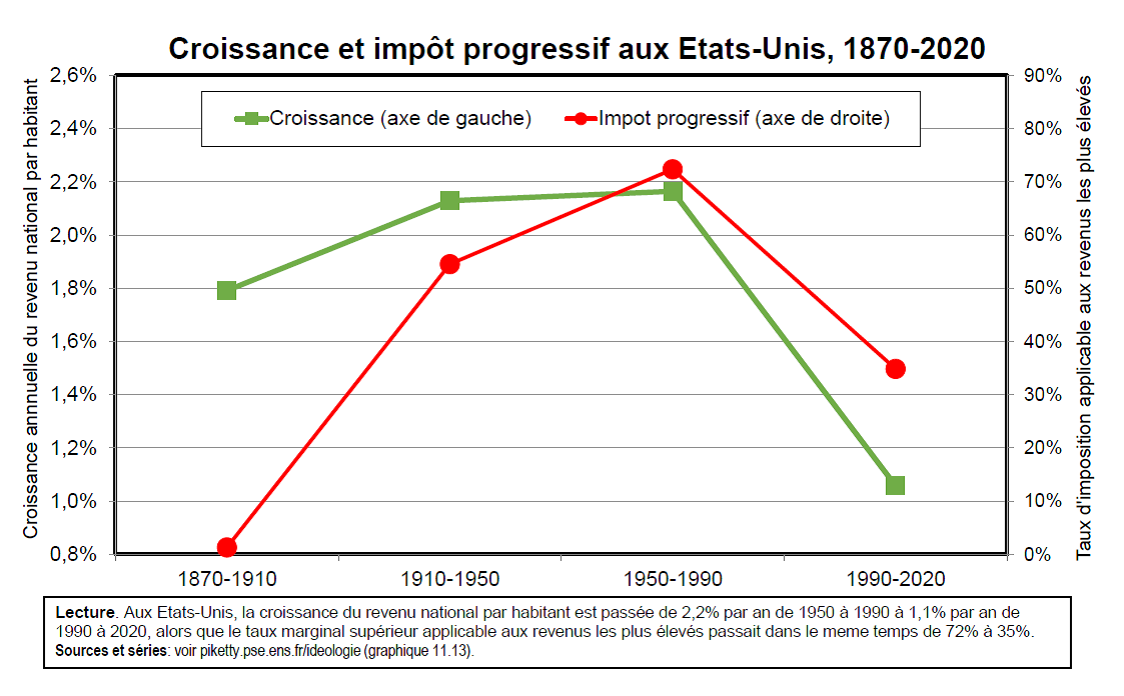13 minutes
#05 – What’s Mine Is Mine
So I just read _Capital et Idéologie_ by Thomas Piketty. This book is about history and more specifically the history of ideologies. The author studies how economic inequalities and their justification evolved in the last centuries. I think it’s worth the reading. It gave me more hindsight regarding the current state of society and the challenges we face. Here are the distilled thoughts.
In the post I discuss about what we thought, what we think, where we are headed, what we should think about. The sections are:
- Past and Present Ideologies
- Towards Uncapped Inequalities?
- Should We Intervene?
- The Problem of Wealth Redistribution
- Final Thoughts
- Dig Deeper
Past and Present Ideologies
An ideology is an inter-subjective myth - a story - we tell each other in order to justify a given state of society. When society is unfair, its ideology - its justification - needs to be strong. If some people have a much better life than you, there better be some good explanation.
To get a better idea, let’s depict some past and present ideologies used to justify different wealth regimes.
It is normal that we have a king ruling us and priests telling us what to do. This brings balance to the society, without them it would be chaos. The king brings protection to our land and the priests bring guidance. Naturally we owe them our labour and taxes so that they can watch over us.
Thinking about having my own land or having my voice heard in the decision process is such a dumb idea.
- Bob
He lived between the 14th and the 18th century in a ternary society where people are divided into three main categories lords, priests and peasants.
It it normal that only the educated men who contributed the most to the society should decide and rule. If you did not contribute and have no wealth you should not be heard.
What a foolish idea to have a system where poor people can vote. They are so ignorant. If they were not, they would not be poor.
- Alice
She lived between the end of the 18th century and the start of the 20th century (1789 - 1914) in a landlords society with censitary suffrage. To have influence you have to be wealthy.
It is normal that each of us is allowed to express his voice and take part in the decision process. We should elect some representatives so that they manage our society using our tax money according to our needs.
That’s the best way towards a beautiful society. I am a happy voter.
- Thomas
He lived during the 20th century (1914-1980) in a social democracy.
It is normal that 8 men own as much as half of the population. When you bring huge value to the society, you deserve huge reward.
If those incentives did not exist we would not be where we’re at. Inequality is perfectly normal.
- Anthony
He lived between the end of the 20th century and the beginning of the 21st century (1980-2020) in pretty much our society.
Those simple examples intuitively teach us that ideologies are not fixed. They did change over time and keep evolving. The way we think, organize and justify the world is not meant to last.
Those four examples are the archetypes of the main ideologies identified by Piketty and correspond to the evolution of society over time. Throughout the last centuries we had: ternary societies, landlords societies, social-democratic societies, neo-landlords societies. Understanding what were stories we told ourselves in the past and those we tell ourselves now is the interest of the book.
Today, Anthony believes inequalities are normal. Are they? Where does that lead us?
Towards Uncapped Inequalities?
Presently we are in a situation where the richer you are, the higher yields you have. This means that overtime the rich get richer faster than anyone else. Or put in another way, not everyone is able to grow its wealth at the same rate. Hence the inequalities keep increasing.
The table below (in French sorry) tells us this story with numbers. The higher your wealth (patrimoine), the higher your real annual growth rate for the past 30 years (taux de croissance réel moyen annuel).

The rise of the highest wealth in the world, 1987-2017 - Source
In simple terms, if you were super rich your wealth grew annually 6.4% for 30 years. If your wealth was average, it grew 1.9% annually. Those are aggregate data which means an individual may be far from the average but overall they remain relevant.
If the biggest capital has the highest yield, ultimately this capital will grow faster than the rest and capture everything else. To picture it in an easy way, let’s imagine a building, a landlord and workers.

Pick your favorite building - Source
The landlord has 4 flats out of 6 in the building and collects a large part of the workers’ wages. After a while he buys the other flats with the extra money from the rent. If the situation is left unchanged the workers children will pay a rent to the landlord children who will be able to buy another building, and so on and so forth. This is the core principle of wealth accumulation.
This is overly simplified because in reality there is competition in the housing market, the workers may try to put money to the side to become landlord themselves, etc. Nonetheless real world data still translate this reality: the biggest wealth have the best yields.
If that trend were to remain the same, we would trend towards a society with uncapped inequalities.
So far this was mostly factual. Now let’s talk politics.
Should We Intervene?
I take as hypothesis that as an individual you aspire to a better society for everyone: better fed people, better care, better quality of life, more happiness. I take that people will disagree on the “how” but the end goal should be the same. If you disagree with the hypothesis, the rest of the discussion will not make sense, sorry.
See the problem with the situation described above is that it is not sustainable. Over time, infinite inequality leads to social unrest and violence within the countries and between the countries.
WWI, WWII are great examples of how economic landscapes and violence are intertwined. Basically when people are not happy within the country (lots of inequalities and economic troubles), they look for culprits and scapegoats, then they fight.
More details about the tensions before WWI are found in chapter 10. Similarly, how hyperinflation in Germany in 1923 and WWII are linked is studied in Ray Dalio’s Navigating big debt crises.
I don’t even judge whether or not this inequality situation is fair. If the trend is unsustainable, it is incompatible with the hypothesis “a better society for everyone”. So if you agree that the situation is unsustainable, I think it would be nice to have some kind of feedback loop to stabilize it. Just like with any system. If you drive too fast, you slow down by lifting your foot.
In this case we understand that to avoid indefinite wealth accumulation, society must “somehow” collectively think about wealth redistribution and capping the inequalities. In other words, if you own all the marbles in the playground, you can’t play anymore. You have to share with the other children to keep playing.
This is where it gets super complicated.
The Problem of Wealth Redistribution
The notion of wealth redistribution is complex and will remain this way. There is no easy answer. This is no science. Why is it hard? There is a how, a what and a where problem.
What’s Mine Is Mine
The how problem.
If you own something, you don’t want it to be taken from you. It would feel like stealing or cheating. If you are given a mug when you enter your new job and one month later HR takes it back for no reason you won’t be super pleased. It’s true for everyone, each with his own intensity.

Your mug - Source
The catch is that when we think about wealth redistribution we often think about other people’s wealth redistribution.
I’m okay with wealth redistribution but I’m not so rich, why should I be taxed more? Those richer guys, they are responsible, not me right?
- Anthony (again)
If everyone thinks similarly you quickly get stuck.
Plus we are legally allowed to own things. If the government takes something you legally acquired, you should be compensated right? Otherwise it’s stealing.
Moreover, if there is no compensation, who knows how much they will take and where it will stop? We don’t want the government owning everything. It was tried in the past and it did not really work. I imagine we may agree with saying that “what was legally acquired should not be taken away without compensation”.
Well, this is the same discourse that the slave owners had when their “property” suddenly became free men. And it worked. Slave owners were compensated large amount of money by society for their “losses”. (see Chapter 6 in “Capital et Idéologie”)
Facing that we could think “That’s crazy, they simply should not have compensated the slave owners, their business was pretty bad to begin with.” But what about the slave owner who sold all his “property” a year before abolition and bought nice houses with that. Should we come after him too? Where is the limit?
Even if intuitively we understand that for the greater good (no more slavery) some intervention is needed and desirable, it is not easy to define the how.
However even if the how is unclear, we collectively should look for an agreement like we do for pretty much everything else. This should not be different. When cannabis is legalized it’s because as a whole we could agree on that (at least I do).
Similarly, wealth redistribution is an issue that society can address even though it is complex. There is no easy/quick fix to the wealth redistribution problem. “Tax the rich” is not enough. To be serious, we need to understand the depth of the problem and discuss the how’s.
Do We Even Want Equality?
The what problem.
We are talking about inequality but what do we even want? Intuitively we know that perfect equality is not desirable nor realistic (you may disagree of course). Let’s imagine Alice.

Hi I'm Alice, nice to meet you - Source
Alice worked hard for 5 years, put money to the side and started her own business: a super cool coffee shop selling fair trade organic beans. Demand is there and the shop needs two more employees to meet the customers needs. How should the coffee be managed?

Best beans in Montreal - Source
Alice Is in charge of Every Decision and the Workers Have No Voice?
That’s not fair because they are working hard to please the customers and are giving more than just time to Alice. They put energy and dedication in every espresso and bring a lot of value to the customers and the business. Maybe they have a word to say about the salaries and the working hours?
“Without Bob’s smile, I would not go to Alice’s shop.”
- Anthony
Should Everyone Have the Same Voice?
That’s not fair because Alice worked hard for years and put a lot of sweat into launching that business. Why should she give some much influence to the two recent employees who’ve been there for only a few months?
There is no easy answer here and this is only for a small coffee. Imagine scaling that kind of discussion to society level. Not easy.
Where Do We Discuss?
The where problem.
Last but not least, let’s pretend the two of us came to an agreement about how wealth redistribution should be managed. For example: “By law, no one can earn more than 50 times the minimum wage. Everything above is collected to pay for medical care, schools and space research.”
How do we reach an agreement in the society as a whole?
Living in a democracy poses challenges by itself. How are the media financed, how are the political parties financed? If the biggest wealths support the channels society uses to discuss, it may be harder to talk about wealth redistribution.

Wealth redistribution in a nutshell - Source
I told you it was complex. The tricky part is that not addressing the problem is equivalent to collectively agree on “let’s leave the trend as it is, it will auto-regulate” (most likely through violence).
Final Thoughts
Between perfect equality and perfect inequality there is a whole range of possibilities that we as a whole could try and experiment. If our goal is the betterment of everyone’s life, I strongly believe we have a lot to gain in addressing those questions. If not we are taking the default choice “no cap to inequalities”, which could be the best if we are lucky but I doubt it.
I don’t have the answers. However I think that we first have to understand what we are dealing with and where we are headed.
I hope this reading will lead you to dig a bit deeper the next time you hear about inequalities because those will have large impacts in the coming years. I hope that collectively we raise our awareness and as a society start looking for better paths for everyone.
Thank you for reading.
Dig Deeper
Interestingly the need for ideology totally falls in line with the discourse of Yuval Noah Harrari about intersubjective myths and the functioning of the system 1 of Kahneman (see my take on the subject here).
Regarding politics, I highly recommend the great Tim Urban and his series of article about Society. Jump in here. For real, go read it.
Some Thoughts About History
I highly recommend people to read a bit more history. It gives more perspective and helps better understand our present world. Some patterns repeat themselves and it’s interesting to notice them. While it’s true that the environment and technology change, human nature pretty much remains the same. Hence the patterns.
Empires are born and disappear no matter the era
To add to that, it is pretty short sighted to look around oneself and try to make sense of the world based solely on what one knows. By definition an individual has lived a very short time with respect to what happened before and if no time is spent digging past information, one can only reach simplistic explanations.
However history is not a panacea, it’s also a trap. It is not science, you can’t reproduce it. It’s hard to establish causality and many different thesis can be defended. Analysis are written then dismissed then improved.
It can be used for disconfirmation though, if a thesis says “A is required in environment B for phenomenon C to work” it can be disproved: “there was environment B and phenomenon C worked without A, please revise your theory”.
Such an example could be “If we tax rich people we will impede growth”. In the years 1950-1980 taxes were high on the highest wealth and it was coupled with a big growth period. So yeah you can have growth and high taxes on the biggest wealth at the same time.

Effective tax rates and their progressivity depending on the income, United States, 1910-2020 - Source

Growth (green, left axis) and progressive income (red, right axis) in the United States, 1870-2020 - Source
The Thread
My mom gifted me that book for Christmas knowing my interest for macro-economy. I think this book is in the same vein as Sapiens in the sense that it expands your thought horizon by providing deeper insight in what were the alternatives.
Should You Read It?
I read it in French and enjoyed it very much. I recommend it if you like work supported by data and research. The first three parts are descriptive and the last part lays down some possible solutions for wealth redistribution. As I am writing this article I only read the first three parts and will finish the last part in the coming weeks.